Airline Strike
An airline strike can drastically affect travel plans, causing disruptions that ripple through various facets of the travel industry. Such strikes occur when airline staff, including pilots, cabin crew, and ground staff, decide to stop work to demand better working conditions, higher wages, or other labor-related issues. This form of industrial action can send shockwaves through the world of travel, impacting not just the passengers, but also the airlines, airports, travel agencies, and related businesses.
Causes of Airline Strikes
Airline strikes generally stem from disputes between airline management and employees. Common issues include demands for higher wages, improved working conditions, better benefits, and job security. When negotiations between labor unions and airline management fail, employees may resort to striking as a last-ditch effort to make their voices heard.
Another common cause for an airline strike is dissatisfaction with management policies. Sometimes, it may be related to changes in work schedules, cuts in employee benefits, or inadequate responses to safety concerns. When dialogues between labor unions and management reach a standstill, it often results in industrial action, impacting travel on a global scale.
Immediate Impacts on Passengers
For travelers, an airline strike can be nothing short of a nightmare. Flights may be delayed or canceled, sometimes with little to no warning. Passengers can find themselves stranded at airports, unable to reach their destinations or return home. In such scenarios, finding alternative modes of travel can be both challenging and costly. Additionally, the uncertainty can lead to missed events, whether personal or professional, adding layers of frustration and stress to an already taxing situation.
An important aspect to consider is the impact on connecting flights. Passengers with layovers can find themselves stuck mid-journey, unable to proceed to their final destination. This can lead to additional expenses for unplanned overnight stays and meals, not to mention the hassle of trying to rebook flights.
Economic Consequences
An airline strike doesn’t just affect individual travelers; it has broader economic implications as well. Airlines themselves face significant financial losses, not only from the immediate cessation of operations but also from the long-term damage to their reputation. Frequent flyers and business travelers who rely heavily on punctual flights may opt for alternative airlines in the future, leading to a loss of loyal customers.
The ripple effect extends to airports, which may experience reduced revenue from fewer passengers using their facilities. Retailers and food establishments within airports may also suffer as the number of footfalls decreases. Travel agencies, tour operators, and even hotels can see a drop in bookings, contributing to a broader economic downturn, particularly in tourist-heavy regions.
Response Strategies
Travelers affected by an airline strike should adopt several strategies to mitigate the impact. First, they should closely monitor news sources and social media for updates on the strike and its resolution. Additionally, keeping in close contact with the airline through customer service channels can provide critical information and alternative plans.
Investing in travel insurance that covers airline strikes can also provide a financial safety net. Many comprehensive travel insurance policies offer compensation for delays, cancellations, and additional expenses incurred due to an airline strike. Passengers should carefully read the terms and conditions to ensure they are adequately covered for such situations.
Flexibility is another key strategy. Travelers who can adjust their travel dates may find it easier to rebook flights and avoid the peak impact of the strike. Those with tight schedules might consider alternative airports or even different modes of transportation such as trains or buses, particularly for shorter journeys.
Airline Strategies
Airlines also adopt various strategies to minimize the impact of a strike. They may engage in negotiations with labor unions to reach a resolution swiftly or employ temporary staff to keep essential operations running. Additionally, airlines may offer refunds or alternative flights to affected passengers, striving to maintain customer satisfaction even amidst disruptions.
Some airlines may reroute flights through unaffected areas or partner with other airlines to accommodate stranded passengers. These collaborative strategies help mitigate the immediate operational challenges posed by an airline strike, though they often come with their own set of logistical hurdles.
Regulatory and Legal Aspects
The regulatory framework surrounding airline strikes varies by country but often aims to balance the rights of workers with the need to maintain essential services. In some regions, labor laws require a minimum notice period before a strike can be legally initiated, giving airlines and travelers some time to prepare. Governments may also intervene in cases where a prolonged strike poses a significant threat to national infrastructure or public safety.
Legally, airlines are often required to offer compensation to passengers affected by a strike. The extent and nature of this compensation can vary, encompassing refunds, rebookings, or monetary compensation for additional expenses. Passengers should familiarize themselves with their rights under local regulations to ensure they receive appropriate remedies during such disruptions.
Long-term Implications
In the long term, frequent airline strikes can damage an airline’s reputation and financial stability. Loyal customers may start looking for alternatives, unwilling to risk future disruptions. Competitor airlines may capitalize on this, attracting passengers by highlighting their own reliability and customer service.
Moreover, a history of frequent strikes can discourage potential investors, making it difficult for airlines to secure funding for expansions or improvements. This, in turn, can impede the airline’s ability to grow and innovate, potentially stymying its competitiveness in an increasingly globalized travel market.
For labor unions, the outcomes of a successful strike can set a precedent for future negotiations, not just within the airline industry, but across other sectors as well. Improved wages, benefits, and working conditions can lead to higher employee satisfaction and retention, contributing to a more stable workforce in the long run.
In sum, an airline strike presents multifaceted challenges that reverberate through the travel industry. From immediate disruptions for passengers to long-lasting economic impacts and regulatory considerations, the ramifications are extensive. Preparedness, flexibility, and understanding the broader implications can help both travelers and industry stakeholders navigate this complex issue more effectively.
Italy Aviation Strike Feb 26, ENAC Protected Flights List

Lufthansa Strike Germany Rebooking and Refund Rules

Lufthansa Strike Recovery Flights Germany Feb 13

Lufthansa Strike Frankfurt Munich Flights Feb 12, 2026
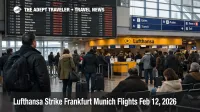
Lufthansa Germany Flight Strike Disrupts Feb 12, 2026

Brazil Azul and GOL Strike Risk for Domestic Flights
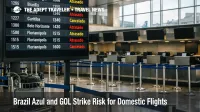
Heathrow SAS Cabin Crew Strike Hits Flights Dec 22 to 26
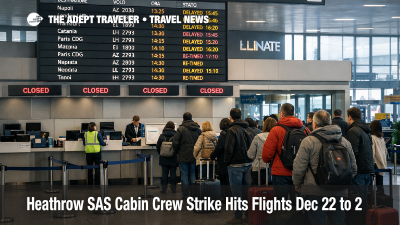
Heathrow SAS Cabin Crew Strike, What to Do Dec 22 to 26
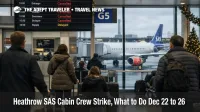
New Zealand Cabin Crew Strike Threatens December 18 Flights

Air Canada crews reject wage deal, dispute moves to mediation

Perth Airport strike to hit intl flights Aug 21 to 22

Air Canada strike settlement: rolling restart and refunds
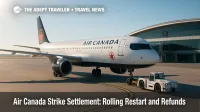
Air Canada strike ends, gradual restart begins

Air Canada Flight Attendants Defy Back-to-Work Order
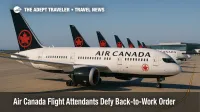
Ryanair Ground Handling Strikes in Spain Start Friday

Air Canada Strike: Cancellations Thursday, Shutdown Saturday

KLM Strike on June 28: How to Avoid Disruption at Schiphol

Strike Impact: Navigating Europe's Travel Disruptions

Travel News: IT Outage and Strikes Affecting Lufthansa, and a Cyclone is Affecting Travel in New Zealand

Travel News: Delta Pilot Strike, 5G on Airplanes, and Emerald Cruises

Travel News: Stikes in Italy, Spirit & JetBlue, and Starlink on Planes

Travel News: Lufthansa, Carnival Cruise Line, and Emirates

